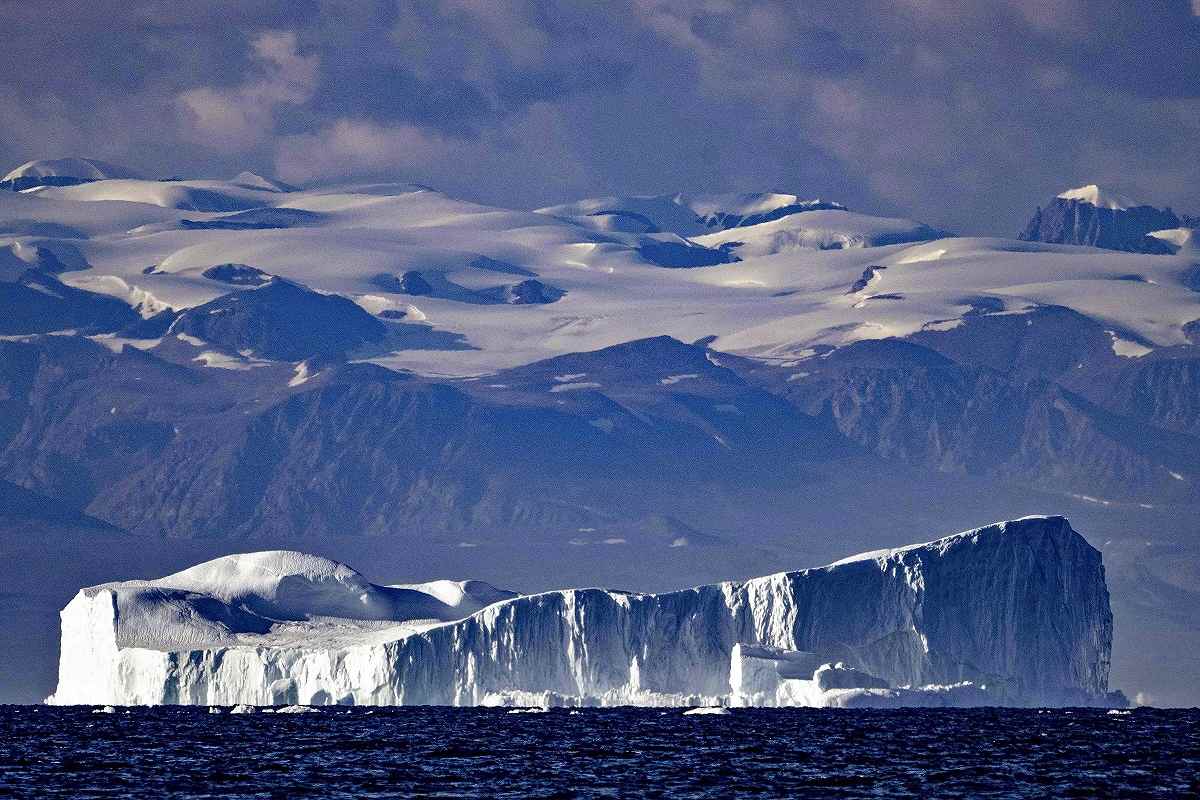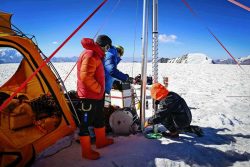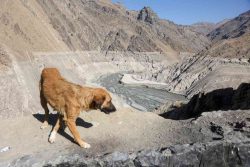
An iceberg a few hundred meters long is seen along the Scoresby Sound Fjord, in Eastern Greenland on Aug. 16, 2023.
15:40 JST, February 14, 2024
PARIS (AFP-Jiji) — Climate change has caused Greenland’s ice sheet to lose 20% more ice than previously thought, according to research published last month that used satellite imagery to track the retreat of glaciers over the past four decades.
Previous studies have found that about 5,000 gigatons of ice has been lost from the surface of the Greenland ice sheet in the past two decades, a major contributor to rising sea levels.
In the new study, researchers in the United States compiled nearly 240,000 satellite images of glacier terminus positions — where glaciers meet the ocean — from 1985 to 2022.
“Nearly every glacier in Greenland has thinned or retreated over the past few decades,” lead author Chad Greene, a glaciologist from NASA’s Jet Propulsion Laboratory, told AFP.
“There really aren’t any exceptions, and this is happening everywhere, all at once.”
They found that over 1000 gigatons (1 gigaton is equivalent to 1 billion tons), or 20%, of ice around the edges of Greenland had been lost over the past four decades and not been accounted for.
“The Greenland ice sheet has lost appreciably more ice in recent decades than previously thought,” researchers said in the journal Nature.
Because the ice at the island’s edges is already in the water, the authors stressed that this would have had a “minimal” direct impact on sea level rise.
But it could herald further overall ice melt, allowing glaciers to more easily slip toward the sea.
Researchers found that the Greenland glaciers most susceptible to seasonal changes — that is expanding in winter and retreating in summer — are also the ones most sensitive to the impact of global warming and experienced the most significant retreat since 1985.
The melting of Greenland’s vast ice sheet — the world’s second-largest after Antarctica — is estimated to have contributed more than 20% to observed sea level rise since 2002.
Rising sea levels threaten to intensify flooding in coastal and island communities that are home to hundreds of millions of people, and could eventually submerge whole island nations and seafront cities.
Last year was the hottest on record, and ocean temperatures were “persistently and unusually high,” according to Copernicus, Europe’s climate monitor.
The Arctic, warming roughly four times faster than the rest of the planet, saw its warmest ever summer in 2023, the result of accelerating human-caused climate change.
Warming of the atmosphere can cause the surface of glaciers to melt and trickle down into the bottom of the ice sheet, which makes it easier for more ice to be lost.
“It’s like putting water between the tire and the road, and the ice just starts to slide right off into the ocean,” said Greene.
Warmer oceans, which have absorbed around 90% of the excess heat caused by humanity’s carbon pollution, are linked to the melting of crucial ice shelves buffering the vast ice sheets of Greenland and Antarctica.
Researchers also raised concerns about another potential impact: The disruption of the deep-water currents that are key drivers of global weather patterns.
They said this flood of extra freshwater melting into the ocean could affect the Atlantic Meridional Overturning Circulation (AMOC), a vast system that regulates the global transfer of heat from the tropics into the northern hemisphere.
A consortium of international scientists last year warned that AMOC changes and melting ice sheets were among some two dozen climate tipping points presenting humanity with an “unprecedented” threat.
Top Articles in Science & Nature
-

Japan Institute to Use Domestic Commercial Optical Lattice Clock to Set Japan Standard Time
-

iPS Treatments Pass Key Milestone, but Broader Applications Far from Guaranteed
-

Record 700 Startups to Gather at SusHi Tech Tokyo in April; Event Will Center on Themes Like Artificial Intelligence and Robotics
-

iPS Cell Products for Parkinson’s, Heart Disease OK’d for Commercialization by Japan Health Ministry Panel
-

Japan to Ban Use of Power Banks on Airplanes
JN ACCESS RANKING
-

Japan PM Takaichi’s Cabinet Resigns en Masse
-

Japan Institute to Use Domestic Commercial Optical Lattice Clock to Set Japan Standard Time
-

Israeli Ambassador to Japan Speaks about Japan’s Role in the Reconstruction of Gaza
-

Man Infected with Measles Reportedly Dined at Restaurant in Tokyo Station
-

Videos Plagiarized, Reposted with False Subtitles Claiming ‘Ryukyu Belongs to China’; Anti-China False Information Also Posted in Japan
























